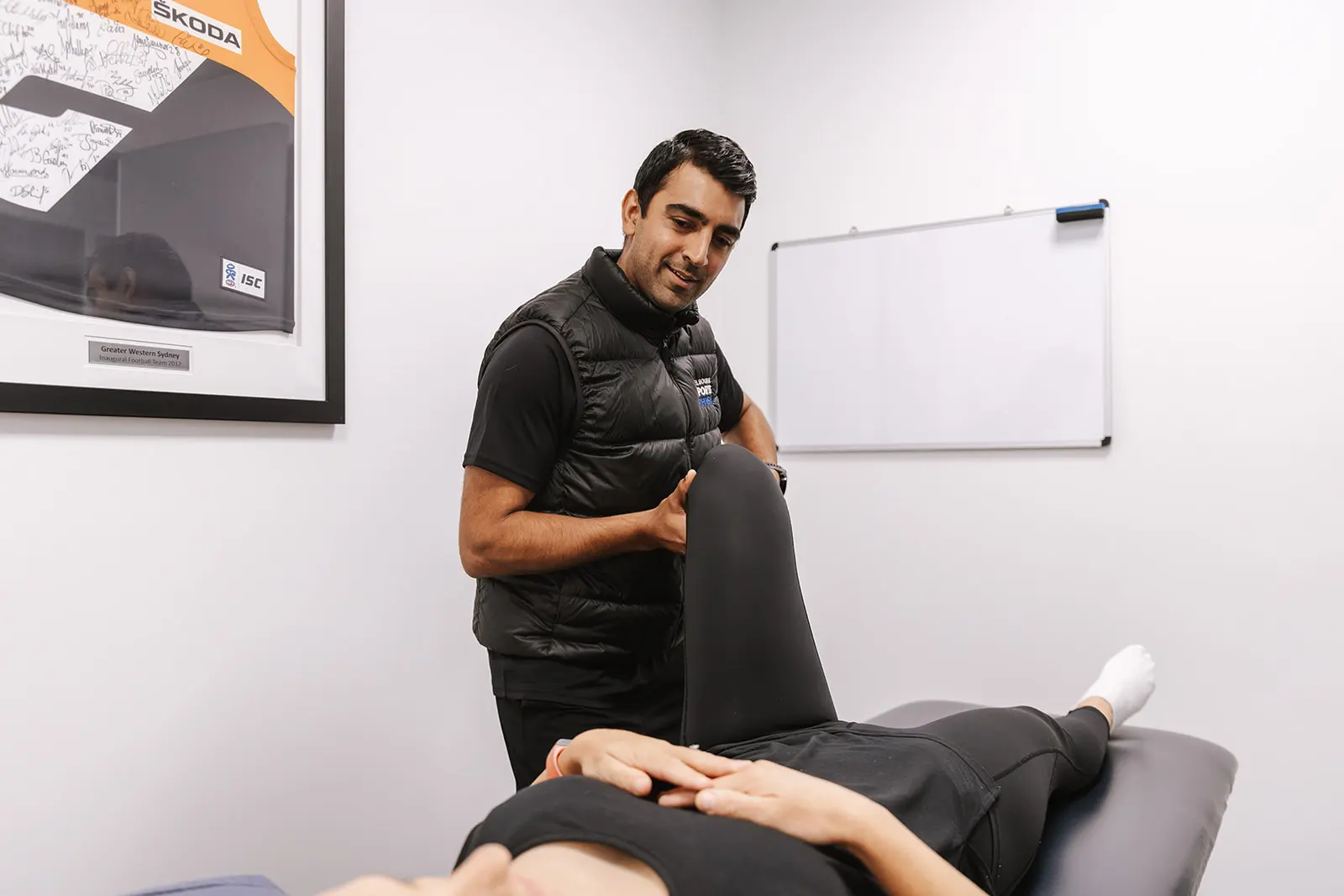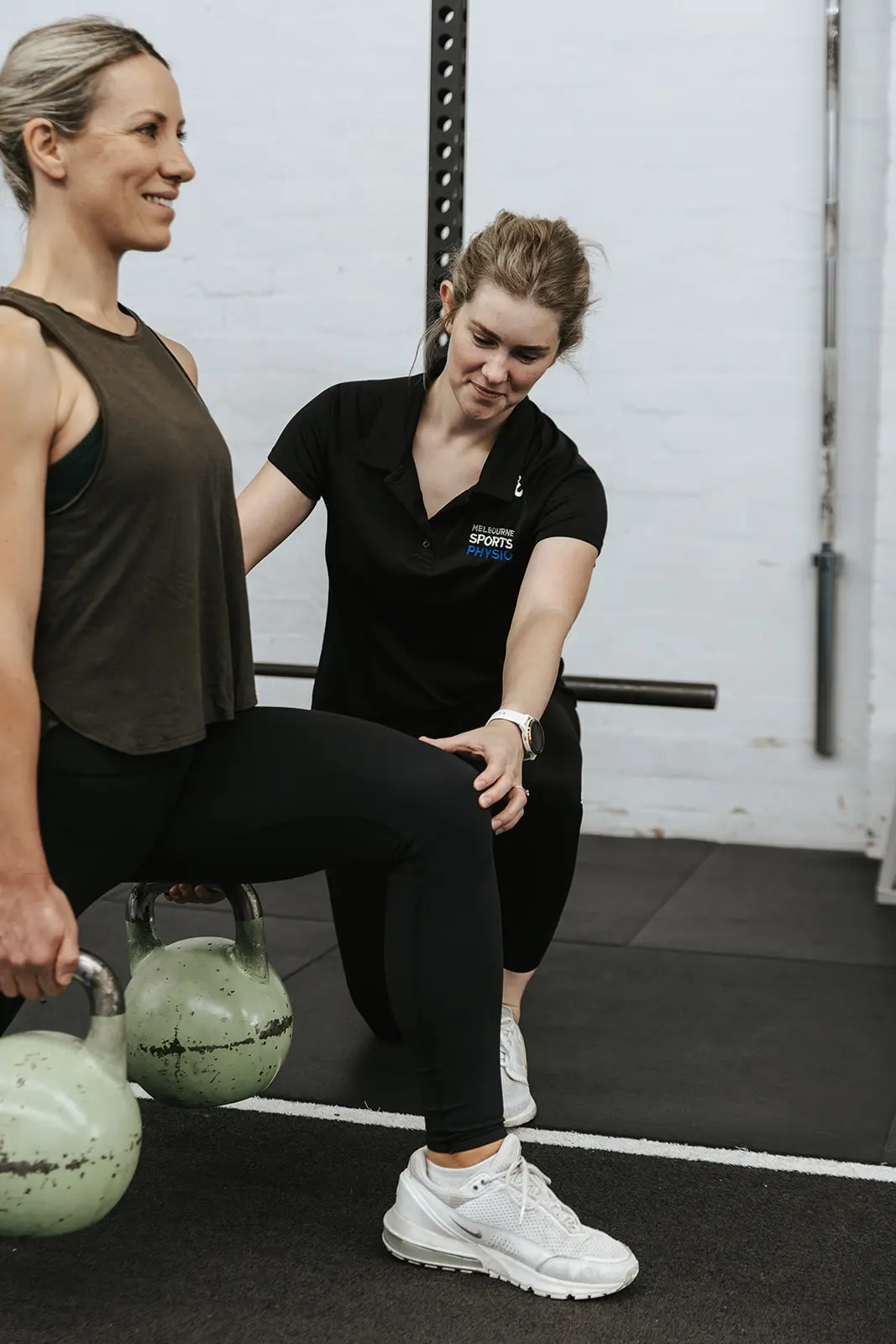July 2025
Laura Kavanagh, Physiotherapist
Medial Collateral Ligament (MCL) Physiotherapy Rehabilitation in Melbourne
Injuring your knee can be frustrating, especially when it affects your ability to move comfortably or play the sport you love.
One of the more common knee injuries, particularly in sports that involve twisting, pivoting or contact, is a MCL injury.
In this article, we’ll explain what the MCL is, how long recovery can take, whether physiotherapy is necessary, and what rehabilitation exercises can support a safe and effective return to activity or sport.
Book Online Now to Fix Your Body
What is the MCL and how is it injured?
The medial collateral ligament (MCL) is a strong band of tissue located on the inner side of your knee which connects your femur to your tibia. Its job is to help stabilise the knee joint by preventing it from bending too far inward.
An MCL injury occurs when the ligament is overstretched or torn. This usually happens during sudden twisting movements, direct blows to the outside of the knee (common in contact sports), or rapid changes in direction.
Types of MCL Injuries:
-
Grade I (Mild): Slight overstretching or minor tearing of the ligament. Knee may feel tender, but still stable.
-
Grade II (Moderate): Partial tear with more noticeable pain, swelling, and instability.
-
Grade III (Severe): Complete tear of the MCL. The knee often feels very unstable and may give way when weight is put on it.
Common symptoms include pain on the inside of the knee, swelling, tenderness, and difficulty walking or bending the knee comfortably.
What our clients are saying about us
How Long Does It Take to Recover from an MCL Injury?
Recovery times depend on the severity of the injury, as well as the individual’s age, general health, and how well the rehabilitation plan is followed.
Typical Recovery Timelines:
-
Grade I: 1–2 weeks
-
Grade II: 3–6 weeks
-
Grade III: 8–12+ weeks
More severe injuries (Grade III) may require bracing or, in rare cases, surgical consultation. That said, most MCL injuries heal well with conservative treatment, including physiotherapy.
Is Physiotherapy Required After a MCL Injury?
Yes, in most cases, physiotherapy is strongly recommended following an MCL injury.
Even for mild injuries, physio can help reduce pain, restore strength and flexibility, and ensure proper healing. It plays a vital role in:
-
Regaining full range of motion
-
Improving muscle strength around the knee
-
Enhancing balance and stability
-
Reducing the risk of re-injury
-
Guiding a safe return to sport or activity
Without proper rehabilitation, there’s a higher chance of developing long-term knee instability, have ongoing pain, or reinjure the knee in the future.
Common Rehabilitation Post a MCL Injury
Rehabilitation is usually broken into phases based on healing progress. Each stage has its own goals and appropriate exercises.
Phase 1: Protection and Pain Management (Week 0–2)
-
Reduce swelling and pain
-
Protect the knee from further injury
Book Online Now to Fix Your Body
Phase 2: Early Strengthening (Week 2–4)
-
Improve muscle strength around the knee (quads, hamstrings, glutes)
-
Regain full knee mobility
Phase 3: Dynamic Strength & Balance (Week 4–8)
-
Improve dynamic control and coordination
-
Enhance stability and prepare for sport-specific movement
Phase 4: Return to Running and Sport (Week 6–12+)
-
Build sport-specific strength and conditioning
-
Return to full function and activity
Book Online Now to Fix Your Body
What Exercises Should I Do to Heal My MCL?
Here are examples of progressive rehab exercises that may be used under physiotherapist supervision:
Early Phase
-
Quad Sets: Tighten your thigh muscles to activate your quads.
-
Heel Slides: Slide your heel along the floor to improve knee movement.
-
Ankle Pumps: Promote circulation and reduce swelling.
Mid Phase
-
Squats: Strengthen quads and glutes with minimal knee stress.
-
Bridges: Activate glutes and hamstrings.
-
Step-Ups: Build functional strength and stability.
Late Phase
-
Lateral Band Walks: Improve hip and knee control.
-
Hops and Bounds: Prepare for return to impact-based activities.
-
Agility Drills: Focus on direction changes, landing control, and reaction.
⚠️ Note: Always work with a physiotherapist to determine the right exercises for your stage of recovery.
Book Online Now to Fix Your Body
Return to Sport After a MCL Injury
One of the most common questions we hear is: “When can I play sport again?”
There’s no one-size-fits-all answer, as it depends on the injury grade, sport demands, and your response to rehab. A rough guideline is:
-
Grade I: Return in 1–2 weeks (low-impact sports)
-
Grade II: 4–6 weeks
-
Grade III: 8–12+ weeks
A safe return to sport involves more than just waiting out the weeks. Your physiotherapist will assess:
-
Strength compared to the other leg using VALD strength assessment technology
-
Ability to jump, land, and change direction safely
-
Confidence in the knee
-
Sport-specific performance testing
Trying to return too early increases your risk of re-injury or other joint issues.
Final Thoughts on MCL Injury
An MCL injury doesn’t have to be the end of your activity or sport. With the right care — especially guided rehabilitation — you can expect a full return to the things you enjoy. Physiotherapy plays a critical role in ensuring your knee heals well, stays strong, and is ready for whatever life or sport throws your way.
Book online to feel & move better again!
Super Simple with Instant Confirmation & No Login Required!
For consultation fees and more information, please visit our Fees and FAQs page or call us on 03 9498 0205.
Some types of consultations may require pre-payment or a deposit. 100% Money Back Guarantee (T&Cs apply).
Learn how our Melbourne Sports Physio Team can help you?
At Melbourne Sports Physiotherapy our goal is to get you moving pain free as soon as possible.
But, we also want you to actually move better and live a healthier, more active and fulfilling life!
If your sports, fitness training or work has been wearing your body down, book in with one of our expert massage therapists so we can help you reduce your pain or stiffness.
If you are showing some signs of this condition or simply want help prevent this from happening in the future then book in with one of our highly experienced Remedial Massage Therapists today!
You can make an appointment by calling or booking online.



